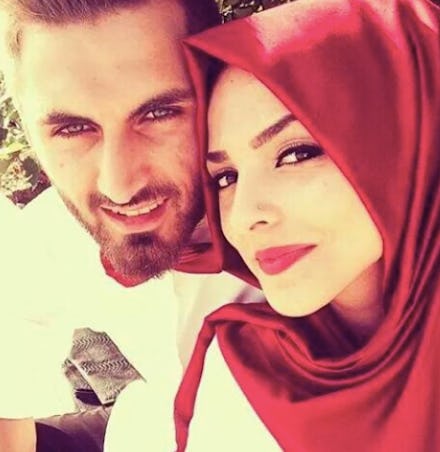This Is What It's Like to Date As a Young American Muslim

Christian Mingle. JDate. J-Swipe. CatholicMatch. Ishqr.
One of those names probably looks less familiar than the others, and for good reason. Young Muslim Americans aren't exactly dominant in the mainstream dating conversation, and that's because "dating while Muslim" is its own unique, oft-misunderstood reality.
Significantly younger and more diverse than the public as a whole, young religious Muslims straddle two worlds. More than 6 in 10 do not see a conflict between being a devout Muslim and living in a modern society, according to Pew data; but 80% of Muslim Americans say that religion does play an important part of their lives. And with devout religion comes tradition that doesn't necessarily mesh with modern dating culture.
Muslim tradition and dating: It’s complicated. Not all young Muslim Americans have serious religious upbringings. But for those who do, the experiences between the genders is often strained and stunted by well-meaning but traditional parents and communities. The messages young people get can go so far as to warn that "seemingly innocuous email exchanges or online dating could topple one off the Islamic path if one lack[s] vigilance." The takeaway for religious young people is that they should marry, but they shouldn't actually date to get there.
At a Muslim "speed dating" event in 2006, Imam Muhamed Magid of the Adams Center summed it up this way: "Don’t talk to the Muslim girls, ever, but you are going to marry them. As for the non-Muslim girls, talk to them, but don’t ever bring one home."
Unsurprisingly, sexual education is also clouded with conflicting and illogical messages (as this humorous essay by Zahra Noorbakhsh makes clear) — that is, when talking about sex happens at all.
As writer and blogger Nashwa Khan noted, "As a fragmented diaspora that is racialized, [young Muslims] are both viewed as oppressed but also hyper-sexualized. It creates a taboo, almost a shame, about sex — even if it’s sex that is entirely halal between a married couple. Many Muslim women are left torn between a dichotomy of desexualized and hypersexualized narratives tossed at them."
Between the pressures of conservative communities and the limitations of traditional unbringings, religious Muslim Millennials aren't faced with as many dating resources as other similar religious groups. But the demand is there.
Could Muslim dating apps be the solution? Families setting up children has existed for years, and Muslim singles events a la "speed dating" are common. But those aren't the solutions all young people are seeking. While scrolling through a discussion forum last year, Humaira Mubeen saw animated discussions on marriage between young Muslims, with an overwhelming number lamented the difficulty of meeting people. The old-school approaches feel awkward, and typical dating services like Tinder or OkCupid have proven unpromising crapshoots for American Muslims (a fact OkCupid data bears out).
So Mubeen and her co-founders created Ishqr in 2013. Originally called Hipster Shaadi, the app aims to connect first-generation Muslim Americans in order to breach "the chasm between Muslim American parents’ expectations and younger generations’ approach to marriage." So far, Ishqr boasts 4,000 registered users, half of whom log in weekly and spend an average of 10 minutes per visit. It's three minutes longer than Tinder's average of 7 minutes each visit.
On Ishqr, about 200 accept a two-way connection each day, which is a lower rate than an app like Tinder — but for good reason. Ishqr, like Muslim American dating sites including HalfOurDeen.com, are geared specifically for marriage-minded users. As a result, Ishqr has produced at least 10 engaged couples so far.
Old stigmas die hard. While online dating among Muslim Americans is on the rise, certain stigmas, rooted in tradition, persist. Many look down on online dating as a last resort, as one engaged couple who met on Ishqr told Mic.
"The option is hella stigmatized." Asif Ahmed said, "[Online dating] is definitely looked upon still." His fiance, Hafsa Sayyeda, concurred: "I definitely felt that some of my best friends thought this was the rather desperate route. They thought, 'Why not just wait to meet someone in person?' For me, meeting someone in person would have been ideal, but as that was not happening, why not use whatever resources I had at my disposal?"
Particularly when those resources are provide a unique opportunity. "Meeting someone in person for the purpose of marriage is awkward," Asif admitted. "Meeting someone online for the purpose of marriage is remarkably less so."
In that way, dating apps are ideal for young Muslim Americans with marriage on the mind. It's easier to state your intentions outright, easier to filter through your options — and, most importantly, easier to connect.
Don’t expect a Muslim Tinder anytime soon. The landscape of Muslim American dating is yet a murky one. A shaky "Muslim alternative" to Tinder, Bliss, launched this past spring promising wholesome relationships within the confines of the religion — but the app doesn't seem to have gained traction. One of the biggest sites, Muslima, has a reputation for being less than trustworthy, and isn't the preferred site of young people. As for Ishqr, the creators are in the midst of developing an accompanying app with the hope of pulling every aspect of Muslim Americans' love lives together.
For now, though, there may never be a Muslim alternative to Tinder. But there's good reason to assume that it's because there probably doesn't need to be.